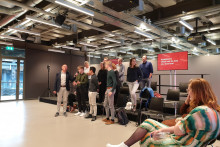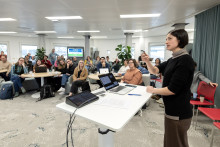The afternoon kicked off with an introduction by Tanya Bondarouk, initiator of the event and dean of the BMS faculty. According to her, the UT is a 'frontrunner' in the field of recognition and rewards, whereby the emphasis is on more varied career paths for employees. 'It's no longer just about writing papers,' Bondarouk stated. ‘In 2020, we published a manifesto with ten principles on recognition and rewards. This afternoon's question is: where do we stand now?’
This question had to be answered on the basis of five statements, introduced by experts from the UT. The participants used their mobile phones to vote on whether they 'agreed' or 'disagreed' with the propositions. They then selected the three – in their view – most important statements, which would be debated. Lastly, chair Van Grieken of the Dutch Debating Institute had a final surprise. The participants were told whether they had to defend or oppose the statement with arguments, regardless of their personal views. ‘We are doing it very academically today.’
Debate
The first statement – ‘leadership development is primarily a responsibility of the individual, not the university – immediately led to quite a debate. Although the proponents came up with good arguments, the opponents managed to find a gap in their defence. Do we only want leaders who step forward based on individual motivation, they asked rhetorically. 'Or should we, as a university, push employees a bit to be leaders?’
The UFO (University Job Classification, ed.) profiles were regularly mentioned in the second debate on the statement 'rules and regulations are the biggest obstacle in implementing rewarding and recognition'. According to the proponents of the proposition, these profiles prove the problem of rules and regulations. The opponents, however, thought that it was mainly the culture and not the rules that stood in the way of implementing rewarding and recognition.
Finally, team-based assessment was discussed. ‘Assessments should only be done on a team level', is what the statement said. Especially the word 'only' was something most attendees could not comply with. After all, what about the 'free riders' in a team? Some of the participants however, saw something in team assessment. ‘It is precisely then that I, as an individual, receive more recognition for my educational tasks,’ said one of the attendants.
After three lively debates, the afternoon came to an end. ‘You respond very well to each other here,' said chair Van Grieken afterwards. ‘Usually, I see debaters mostly share their own opinion.’ After this compliment, the last word went to dean Bondarouk. How did she look back on the afternoon? ‘The three chosen statements show what is important to employees in the field of recognition and rewards. We will go further with this. Change will never come if we keep waiting.’







